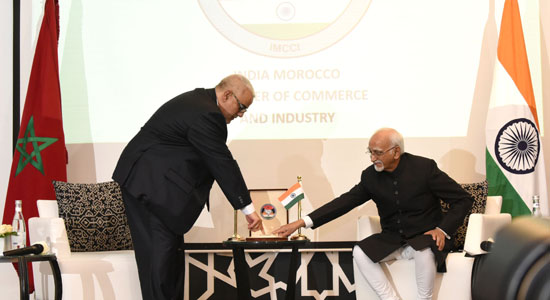
NEW DELHI, June 1:
Vice-President M Hamid Ansari today said the challenge for the modern world is to ”accept diversity as an existential reality” and configure attitudes and methodologies for dealing with it. In countries having complex societal makeup, accommodation of diversity in political structures and socio-economic policies ”is not an option, but an imperative necessity,” ignoring which can have unpleasant consequences, he said, delivering a lecture at the Mohammed V University in Rabat, Morocco, on the topic ‘Accommodating Diversity in a Globalising World: The Indian Experience’.
Elaborating, the Vice President said Indian Muslims have lived in the country’s religiously plural society for over a 1,000 years and that has impacted on modern India and its existential reality of a plural society on the basis of which, a democratic polity and a secular state structure was put in place.
He said the framers of the Indian Constitution had the objective of securing civic, political, economic, social and cultural rights as essential ingredients of citizenship, with particular emphasis on rights of religious minorities.
”The Muslim experience in modern India is that its citizens professing Islamic faith are citizens, consider themselves as such, are beneficiaries of the rights guaranteed to them by the Constitution, participate fully in the civic processes of the polity and seek correctives for their grievances within the system. There is no inclination in their ranks to resort to ideologies and practices of violence,” he added.
Dr Ansari said the Indian model was of relevance to the globalising world because in India, an attempt was being made to look beyond the traditional virtue of tolerance and seek acceptance of diversity and adopt it as a civic virtue. The Vice-President reminded the audience that presumptions of Muslim cultural homogeneity and continuity did not correspond to social reality.
Describing Islam as a global faith with adherents in all parts of the world, with rich and diversified history, he said ”In different ages and regions, the Muslim contribution to civilisation has been note worthy. In cultural terms, the history of Islam ”is the history of a dialogue between the realm of religious symbols and the world of everyday reality, a history of the interaction between Islamic values and the historical experiences of Muslim people that has shaped the formation of a number of different but interrelated Muslim societies.”
Acknowledging that an overwhelming number of Muslims of the world were non-Arabs and live in societies that are not Arab, Dr Ansari said India counted among its citizens, the second largest Muslim population in the world numbering 180 million and accounting for 14.2 per cent of the country’s population of 1.3 billion, an official statement said here.
Positing that the challenge for the modern world was to accept diversity as an existential reality and seek acceptance of diversity and adopt it as a civic virtue, he concluded saying ”We in India are attempting it, cannot yet say that we have succeeded, but are committed to continue the effort. We invite all right-minded people to join us in this endeavour.”
The Moroccan University later conferred an honoris causa degree on the Vice-President. (UNI)

